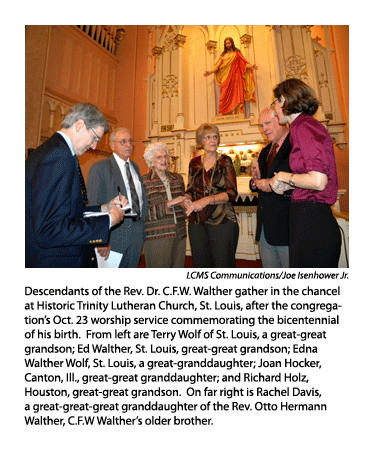ST. LOUIS — Some half-dozen direct descendants of the Rev. Dr. C.F.W. Walther — including a great-granddaughter — joined 160 others Oct. 23 for a special worship service at Historic Trinity Lutheran Church here to mark the bicentennial of his birth. He was born on Oct. 25,1811, in Langenchursdorf, Saxony, Germany.
Walther was pastor of Trinity for 46 years, when he also served as the first president of what is now The Lutheran Church–Missouri Synod (LCMS) and Concordia Seminary, St. Louis.
The service followed the original order of service that Walther re-instituted for use by the Saxon immigrants who first settled in St. Louis. Later, part of the group moved 90 miles south to Perry County, Mo. That service has been handed down via LCMS hymnals including its current Lutheran Service Book, where it appears in part as “Divine Service, Setting Three.” The bicentennial-service worshipers also sang the Easter hymn by Walther: “He’s Risen, He’s Risen, Christ Jesus, the Lord,” as well as Martin Luther’s “A Mighty Fortress is our God.”
appears in part as “Divine Service, Setting Three.” The bicentennial-service worshipers also sang the Easter hymn by Walther: “He’s Risen, He’s Risen, Christ Jesus, the Lord,” as well as Martin Luther’s “A Mighty Fortress is our God.”
Trinity’s chancel was specially adorned for the service — with paraments dating back to the 1890s — featuring lace tatted by one of the Saxon immigrants at the front of the altar, lectern and pulpit from which Walther preached.
From that pulpit, the Rev. Dr. Dale A. Meyer, current president of Concordia Seminary, St. Louis, delivered the sermon for the anniversary service.
Meyer noted that in the Gospel lesson for the service — from John 1 — Greeks told Phillip that they wanted to see Jesus.
“Let that be the prayer, the takeaway from this wonderful commemoration of C.F.W. Walther,” he told the worshipers. “[It’s] Jesus and you, Jesus and me — following Him now with eyes of faith [which] … one day will see Him in heaven.” He said that “courage” and “cheerful confidence” should characterize their lives as followers of Jesus.
Meyer recalled that for the new movie “Walther” — produced by the seminary for the bicentennial observance — he was asked what it means to him to follow in the footsteps of Walther as seminary president.
“I had never thought about that,” he said he had answered.
“It’s about following Him who goes ahead of you and me,” he added, turning back to the Gospel lesson. “And that’s no small part of the legacy of C.F. W. Walther,” he said, reminding the congregation of Walther’s theological writings that are used to this day to prepare pastors in the Synod and elsewhere.
“His writings are a voice from the past that lay out the implications of this Gospel-filled, grace-filled faith in Jesus Christ,” Meyer said.
After Meyer’s sermon, readers representing several ministries and judicatories of the Synod presented a six-part overview of the life and teachings of Walther. They were titled “Thy Word Is Truth,” “Past Defenders of the Truth,” “The Young Walther,” “Walther the Student,” “Walther the Churchman” and “Walther the Teacher.”
The Saxon immigrants founded Trinity in 1839. During C.F.W. Walther’s pastorate, the congregation spawned a number of other St. Louis congregations that he served and led in worship each Sunday. The horse-drawn carriage that Trinity bought for him to make that weekly circuit is now in the museum space of Concordia Historical Institute at the LCMS International Center in Kirkwood, Mo.
Walther died on May 7, 1887. He and his wife, Emilie, are buried at the Walther mausoleum in Concordia Cemetery, in St. Louis.
Posted Oct. 25, 2011



